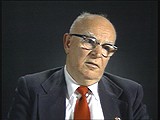You searched for: ���������������������������������������������fuk7778���your
<< Previous | Displaying results 101-110 of 163 for "���������������������������������������������fuk7778���your" | Next >>
-
Blanka Rothschild describes the beginning of the German invasion of Poland when she and her family were in Lodz
Oral HistoryBlanka was an only child in a close-knit family in Lodz, Poland. Her father died in 1937. After the German invasion of Poland, Blanka and her mother remained in Lodz with Blanka's grandmother, who was unable to travel. Along with other relatives, they were forced into the Lodz ghetto in 1940. There, Blanka worked in a bakery. She and her mother later worked in a hospital in the Lodz ghetto, where they remained until late 1944 when they were deported to the Ravensbrueck camp in Germany. From Ravensbrueck,…
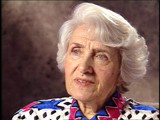
-
Sandor (Shony) Alex Braun describes how music gave him the strength to survive while imprisoned in concentration camps
Oral HistoryShony was born to religious Jewish parents in a small Transylvanian city. He began to learn the violin at age 5. His town was occupied by Hungary in 1940 and by Germany in 1944. In May 1944, he was deported to the Auschwitz camp in Poland. He was transferred to the Natzweiler camp system in France and then to Dachau, where he was liberated by US troops in April 1945. In 1950, he immigrated to the United States, and became a composer and a professional violinist.
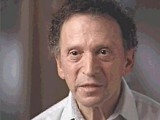
-
Vladka (Fagele) Peltel Meed describes participating in activities of the Bundist underground
Oral HistoryVladka belonged to the Zukunft youth movement of the Bund (the Jewish Socialist party). She was active in the Warsaw ghetto underground as a member of the Jewish Fighting Organization (ZOB). In December 1942, she was smuggled out to the Aryan, Polish side of Warsaw to try to obtain arms and to find hiding places for children and adults. She became an active courier for the Jewish underground and for Jews in camps, forests, and other ghettos.
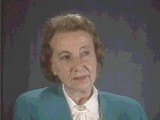
-
Susan Bluman describes the German invasion of Poland
Oral HistorySusan was 19 years old when Germany invaded Poland in September 1939. Her boyfriend, Nathan, was in Lvov when the Soviet Union occupied eastern Poland. Nathan sent a guide to Warsaw to bring Susan to the Soviet zone of occupied Poland. Her parents reluctantly agreed after Susan promised to return to Warsaw within two weeks. Upon her arrival in Lvov, Susan married Nathan. The couple then fled across the Lithuanian border to Vilna, where they stayed for a year. They received a visa for transit through Japan…
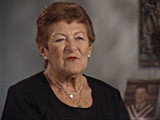
-
Johanna Gerechter Neumann describes anti-Jewish measures in Hamburg, Germany
Oral HistoryAmid intensifying anti-Jewish measures and the 1938 Kristallnacht ("Night of Broken Glass") pogrom, Johanna's family decided to leave Germany. They obtained visas for Albania, crossed into Italy, and sailed in 1939. They remained in Albania under the Italian occupation and, after Italy surrendered in 1943, under German occupation. The family was liberated after a battle between the Germans and Albanian partisans in December 1944.
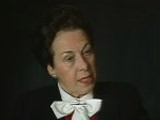
-
Sam Spiegel describes life in a displaced persons camp
Oral HistoryIn 1942, Sam was forced into a ghetto in his hometown and assigned to work in a munitions factory. In 1944 he was transported to Auschwitz and then forced to work in a train factory. He survived eight days on a death march after the evacuation of Auschwitz by the Nazis. He was liberated by Soviet units in January 1945. He lived in a displaced persons camp in Germany where worked for the United Nations Relief and Rehabilitation Administration. In 1947, he immigrated to the United States.
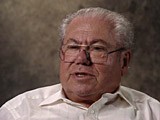
-
Fred Deutsch describes some of the risks involved in hiding
Oral HistoryFred was born in Czechoslovakia in a town near the Polish border. Fred and his family were forced by the Germans to relocate east to a town bordering Slovakia. At the end of 1942, they escaped from the town and went into hiding. The family hid in bunkers in the forest until the end of the war. They moved every few weeks to avoid detection by the Germans or Slovak authorities. While the family was in hiding, Fred's grandfather made arrangements for Fred to attend school under an assumed name and religion. A…
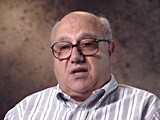
-
Leo Melamed describes speaking several languages as a child in prewar Bialystok
Oral HistoryLeo was seven years old when Germany invaded Poland in September 1939. Before the war, Leo's father was a mathematics teacher and member of the Bialystok City Council. Fearing arrest, Leo's father fled Bialystok for Vilna just before the German occupation. Leo and his mother eventually joined his father in Vilna. After the Soviets occupied Vilna, Leo's father obtained transit visas to Japan. The family left Vilna in December 1940, traveled across the Soviet Union on the Trans-Siberian Express, and arrived…
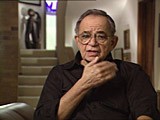
-
Leo Melamed describes fear after German occupation of Bialystok
Oral HistoryLeo was seven years old when Germany invaded Poland in September 1939. Before the war, Leo's father was a mathematics teacher and member of the Bialystok City Council. Fearing arrest, Leo's father fled Bialystok for Vilna just before the German occupation. Leo and his mother eventually joined his father in Vilna. After the Soviets occupied Vilna, Leo's father obtained transit visas to Japan. The family left Vilna in December 1940, traveled across the Soviet Union on the Trans-Siberian Express, and arrived…
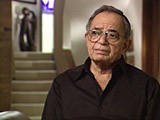
-
Joseph Stanley Wardzala describes the badge Poles had to wear in forced-labor camps in Germany
Oral HistoryJoseph and his family were Roman Catholics. After Germany invaded Poland in 1939, roundups of Poles for forced labor in Germany began. Joseph escaped arrest twice but the third time, in 1941, he was deported to a forced-labor camp in Hannover, Germany. For over four years he was forced to work on the construction of concrete air raid shelters. Upon liberation by US forces in 1945, the forced-labor camp was transformed into a displaced persons camp. Joseph stayed there until he got a visa to enter the…
